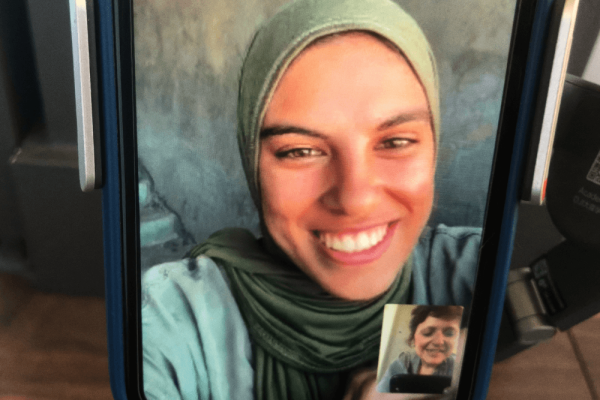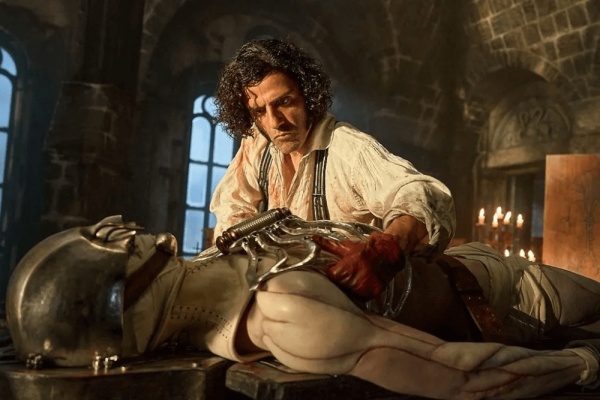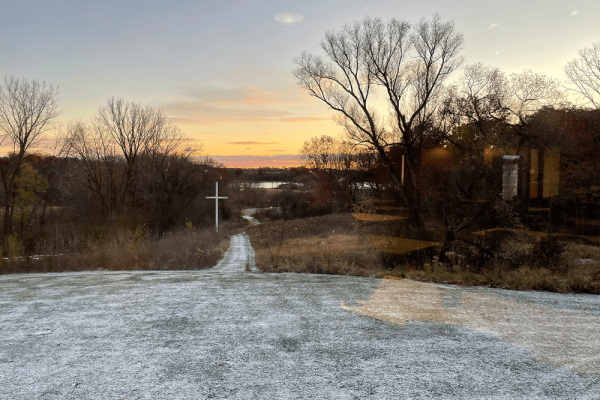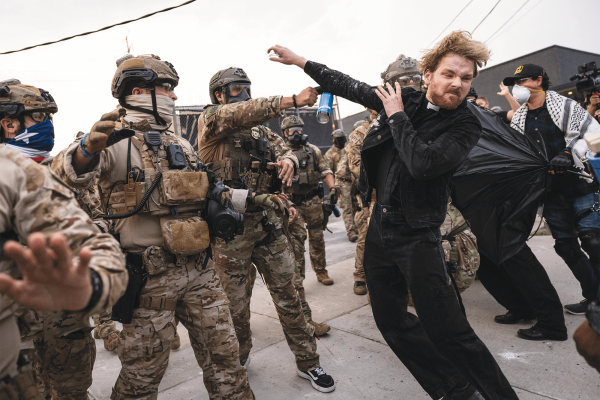This interview is part of The Reconstruct, a weekly newsletter from Sojourners. In a world where so much needs to change, Mitchell Atencio and Josiah R. Daniels interview people who have faith in a new future and are working toward repair. Subscribe here.
On May 15, I settled in to watch the Atlanta Dream begin their WNBA season against the Los Angeles Sparks. I rarely stay up to start a West Coast game that begins after my bedtime, and it’s even more rare that I finish a game. But on top of a thrilling game (which the Dream, my favorite team, won) I was captivated by the play of the Sparks’ Layshia Clarendon.
Clarendon, who uses they/them, he/him, and she/her pronouns interchangeably, recorded their first ever triple-double — only the fourth in team history, and only the 31st in the history of the entire WNBA at the time.
As impressive as Clarendon’s triple-double was, it’s far from his first major accomplishment on the court. In 2009, she won a gold medal with Team USA Women’s U19 team. In 2013, he led the University of California, Berkeley to the team’s first Final Four appearance. In 2017, they were selected as a WNBA All-Star.
But none of these accomplishments are why I wanted to interview Clarendon. I wanted to interview him because of a feature profile written by ESPN’s Katie Barnes, where Clarendon’s strong faith was central.
“To me being Christian means f---ing s--- up,” Clarendon told Barnes. “That’s what Jesus came to do. It means disrupting and fighting for the most marginalized people.”
And fight for the most marginalized she has. The first openly nonbinary WNBA player and first to undergo top surgery while playing, Clarendon has regularly redirected the attention on them toward the inclusion of all people in sports and society.
During the 2020 WNBA season, they helped lead players in protesting police violence against Breonna Taylor and other Black women. Clarendon helped launch the WNBA’s Social Justice Council, alongside players like Sydney Colson, Breanna Stewart, Tierra Ruffin-Pratt, A’ja Wilson, and Satou Sabally. Clarendon signed on to the Athletes for Ceasefire in Gaza, and they launched a foundation to provide grants that help transgender people access health care and other services.
Currently, Clarendon and her colleagues have been especially vocal about two issues: Reproductive rights in the U.S. and opposing the French ban on hijabs and headscarves before the 2024 Olympics.
This interview has been edited for length and clarity.
Mitchell Atencio, Sojourners: For readers who don’t know you, how would you introduce yourself?
Layshia Clarendon: I would say I’m a freedom fighter. I’m an athlete. I’m a person who believes deeply that none of us are free until we’re all free. I’m a parent, a friend, a very outspoken person. Career-wise, I’ve played professional sports for the last 11 years in the WNBA.
You’ve been a member of The Way Christian Center, a church in Berkeley, Calif., since college when a friend invited you. And that’s often where you talk about your faith growing in earnest. Amid the many bad examples of evangelism, I was curious what you think your friend did right. What was that invitation like, and what were those first few visits like?
I was invited by a teammate in college who I was friends with before we went to Cal together. So, it was someone that I was already in relationship with, which I think is important because she’s someone that I knew and trusted. When she extended the invite, it didn’t feel like that evangelical, “I just met you, and I’m trying to drag you to Jesus, because I think you need to be saved and you’re a sinner.”
Too often, we’re so quick to try and grab or judge people and pull them in, [instead of] being in deep relationship together.
The invite felt loving, it felt open, and it felt welcome. I actually turned her down the first time and didn’t go. I happened to go the next weekend. There was patience, grace, and no agenda attached to the invitation, which was so beautiful and loving to me.
My friend is super outspoken about her faith. I already knew where she stood and the person that she was. She knew some of my backstory with my family using the Bible against me and that I was queer. She literally just offered: “Hey, I found this dope church here called The Way, do you want to go check it out with me?”
Now I know that deep down that God was pulling me there. I had an openness to the invitation, even though I had such, frankly, terrible experiences with Christianity — being told I was going to hell by my parents, what I had been taught about who God was, or what the Bible said — but I still just had an openness to check it out.
How does faith affect your understanding of social justice work? To use the religious language, the work on behalf of “the least of these”?
They’re deeply tied together to me. [Through social justice] is how I learned who Jesus was — this radical brown man who would have been best friends with a person like me, or best friends with the houseless people in Oakland that the Supreme Court just ruled can be criminalized now.
For me, faith and activism go hand-in-hand. I don’t think they exist without each other. They’re so deeply woven and tied to me. I have a deep gratitude for [The Way], the first adult church I ever attended is still my church home to this day. Pastor Mike [Michael McBride] and them modeled [faith and social justice] for me from the beginning.
That’s what made me fall in love with that church and Jesus. I was like, “Oh, wait I’ve been lied to. Nobody told me this dude was this amazing, dope radical.” That ignited me and set my heart on fire. It gave me freedom and power to speak out even more. I was like, “Oh, y’all have been f------ lying. There’s a reason people don’t want us to know the truth.”
That’s what gave me the courage to really come out as myself. I felt that love — from Jesus, from God, from the Divine — that who I was meant to be was someone who radically walked this earth and spoke the truth.
I feel like I’m often trying to convince my friends in faith and justice work that sports are important, and that’s because they formed me in such important ways. What has sports taught you that you carry into social justice work?
One of the biggest lessons in sports that connects with social justice work is being put in the same situations or community as people you wouldn’t normally be around. There are people I’ve met in sports — forced to be on a team with, frankly — that I probably wouldn’t have chosen to hang out with. Maybe we had different values or beliefs or ways of thinking. But that’s part of life, and part of social justice work is being able to meet people where they are. Especially as a leader, I’ve had the big lesson of learning how to motivate people and get people on board for common goals.
In sports, we all want to win, that’s the common goal. In activism, if we want to get a bill passed, or we believe people should be housed, or the cost of food should be lower, or people should have access to reproductive rights — whatever the goal — [The question is]: How do you unify people?
240723-clarendonlayup.png

The thing you’ve seen with the WNBA, we’ve been effective at identifying a common goal and unifying people to put aside our individual differences and be united in that common goal.
In 2020, the bubble season, [some of us] had different views about how that season should have gone. But at the end of the day, we knew the power of the 144 of us. We had to get on the same page. The thing that unified us was going after [then-Sen. and then-Atlanta Dream co-owner] Kelly Loeffler and trying to get Rev. [Raphael] Warnock elected. We found a common goal around that, and [strategized] how we were gonna fight, how we were gonna have each other’s backs.
Did we always agree how it should be done and who should be doing what position or what role? No, but we found a way at the end of the day.
The power of sports, and the ability to organize within sports, has felt like such a beautiful, hard lesson to learn while I’m playing. I think it will carry over outside of sports.
You sound like a union organizer.
Vice president of the [WNBA] player’s association for six years!
And now you’re on the Justice, Equity, Diversity, and Inclusion (JEDI) Committee for the WNBPA. What has that work looked like this year specifically?
One: Identifying a common goal. Before the season, we identified how important reproductive rights are in this moment in time. We’re trying to narrow our scope.
In [the bubble season in] 2020, we were able to have a broader scope — the world was paused, everyone was in one place, we were not traveling, our families weren’t there. As we’ve come out of the bubble season, we’re learning, “Wow, look, life’s happening. We’re traveling. It’s not the same cadence.” So, we have to be more specific and narrow with our focus to have more impact. We can’t do everything. Learning our capacity has been a really important lesson.
[Practically], it’s looked like the organizing work of having phone calls, talking to people. The JEDI Committee is the player side, and the whole of the Social Justice Council is in conjunction with the league side. We work with these two separate entities [the WNBA and WNBPA] that have to come together.
The WNBA is a corporation at the end of the day. They have their own agenda as a corporation with sponsors, a board of governors, things like that to answer to. We are on the player side of [being] very radical and ready to talk about things in a way that [pauses] sometimes doesn’t align with [a corporation]. But we do have the common goal of reproductive rights. We want this to be something that can catalyze people to go to the polls this November. We want folks to know that our reproductive rights are on the ballot.
[We’ve] been working with the league to do activation around the WNBA Commissioner’s Cup, the All-Star Weekend in Phoenix, and picking the organizations we’re going to partner with.
In another interview I did recently, [Ashley Lynn Hengst] and I discussed how sports is the first place some folks are given permission to find pleasure in our bodies. And we discussed how important that can be from a faith perspective. Does that resonate for you at all?
Yes, that definitely resonates. Wow. I have to write that down. I can see, compared to other friends and folks who haven’t been in this space, how impactful the fact that I have played this sport has been.
Especially as a queer person, as a trans person, we can so often be detached from our bodies — for all the reasons, all the traumas. Sport is the one place where you always come home. You have to be embodied when you play. There is a deep invitation to be in your body in sports, and it’s really beautiful. I take it for granted because I’ve done it my entire life — I’ve always played sports and been embodied. It’s my everyday existence being in this sport, but I know it’s a beautiful gift.
I love that language of invitation to be in our bodies. My spouse and I play tennis together, and they recently had top surgery. I knew it would be good for them, but it was still a surprise how at home they seemed in their body when we played after their recovery. It wasn’t that they gave more effort, it was like they had more effort to give.
I remember putting on my jersey in ’21 when I played for the Minnesota Lynx that year [after my top surgery]. The way my jersey fell over my chest, it was like, “I’m really just out here playing with no boobs!” I would just laugh before the game. [I felt] silly and embodied and joyful. You can’t measure the impact on your performance when you get to be like your whole self. Like you said, you’re not carrying that extra baggage. There’s no way to truly quantify it.
You perform better when you’re a better, more whole person. And that works in every aspect of life that I’ve witnessed. I’m a better partner, a better parent, a better — frankly — worker in this capitalist system. I’m a better version of who I am for all the people around me and for my community and for the world.
As we talk about trans inclusion in sports, I wonder if you could sketch out your ideal future. There are so many important steps to take right now to protect trans kids, but what does the future of gender expansive sports look like to you?
The future to me is as simple as letting people play where they feel good. It could be that simple. I dream of a place where people just have access to play the sport with the gender that they are. It feels overly simplified, but I truly don’t think it is.
[The bans on trans inclusion] are cases from people who are 7 years old all the way through Olympians. And we know there’s different levels and obviously different rules in place the higher you go. But the rules in place at lower levels [are] insane when we’re talking about 7-year-olds.
[The future] is a place where people get to show up and play the sport and they’re not excluded. Where we have collaborative efforts on what makes sense and where people fit.
My dreamiest world is one where we acknowledge sports have been designed based on this binary system; now we know people don’t exist in a binary, [and we ask], “What’s a practical solution to think about how to fit these people in and not exclude them?”
Again, we [need to] have a common goal. The common goal is to make sure people can play sports. And that’s not the common goal, currently, in our culture as a collective.
We know when people play sports, there are so many good things that you get — for people individually and collectively. You learn how to be a part of a team; it boosts your confidence; you get to be embodied; you get to sweat so your mental health is better because you’re exercising; oftentimes you’re getting outdoors, and either way, you’re moving your body. To me, the dreamy world is shifting the culture toward including people.
You mentioned the Olympics. You’ve been part of advocacy on behalf of hijab-wearing athletes at the Olympics, where France is upholding its ban on headscarves even for international athletes. How did that come about?
Athlete Ally reached out, and they’re organizing efforts, and the WNBPA union had a call about it. Our union has signed on to support our friends wearing hijabs. People oftentimes look to our league as a league that has been outspoken and — frankly — always been on the right side of history. So, we are just continuing to set that example. It’s a no-brainer in terms of support.
[France’s ban on hijabs] sucks. It makes me emotional, because it’s just another layer [of oppression] and it’s comical the reasons why we exclude people. With my heart of centering who Jesus was — he would have been friends with the most excluded — and our league being the ones that people look to in this moment in time of women’s sports, [of course] we will continue to stand up for folks.
Your child was born in 2020, has parenting changed anything for you in terms of sports, faith, or activism? I’m sure it’s changed everything —
That’s what I was going to say, it’s changed everything.
But is there anything specifically that you recognize differently because of parenting?
One of the gifts my child has given me is a reminder of the joy of playing sports. It’s easy to get lost in the grind of professional sports when it’s your job. There’s just [pauses] I don’t know. Trades, and cuts, and it’s grueling, and you’re exhausted. But my child’s joy and smile — when I see them playing on their little blue and orange hoop in our house, in the front yard, or when we go to the park — it reminds me why I started playing this sport in the first place and why I want to continue to fight for people to be included to play this sport.
I don’t know my kid’s gender identity yet, but I’m being reminded that I’m fighting for the kid in my house and for every kid around the world to be included, to be safe, to have the right to live a life that’s worthy of them being a whole person.
Got something to say about what you're reading? We value your feedback!






